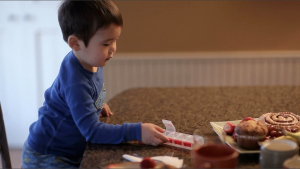March is Poison Prevention Month!
Sharing is caring!
Make Poison Prevention a Priority
Kids are naturally curious- getting into cabinets, drawers, really anything can spark their interest. We normally want to foster a child’s curiosity, but when it comes to safety we don’t want to take any risks. There are many ways for kids to be exposed to poisons in the home, with the most harmful being medications. In fact, every 8 minutes, a child is treated in the emergency department for medication poisoning.
So as it comes to a close, review the following facts and tips to make sure your kids are protected from poisons in and around the home.

Facts
- Children under 5 are at greatest risk for medication poisoning.
- 75% of all young child ER visits for medicine poisoning involve the child ingesting the medicine of a parent or grandparent.
- In 2011, 12,390 children required hospitalization due to accidental medication exposures.
- 9 out of 10 poisonings occur in the home.
Tips
Storing and Disposing of Medications
- Ensure that all medications, including vitamins, are stored out of sight and reach of children.
- Do not keep expired or unused medications in your medicine cabinet.
- To dispose of medications, pour the medicine into a sealable plastic bag, and add water to dissolve it if the medication is in pill form.
- Reference the Food and Drug Administration when disposing of medicine as they recommend that some be flushed down the toilet because of their extreme danger.
Poisons in the Home
- Keep household items such as laundry detergent, bleach, and cleaning supplies out of reach or use safety locks on cabinets.
- Do not put cleaning products into an unlabeled container as children may mistake them for something safe to eat or drink.
- Read all product labels to determine what products are hazardous to kids. These include items such as makeup, pesticides, and craft supplies.
Carbon Monoxide
- Install a carbon monoxide detector near all sleeping areas in the home.
- Never leave a vehicle running in the garage, even if the door is open.
- Turn off fireplaces and space heaters while you and your family are asleep.
- Make sure that all fuel-burning appliances are inspected by a technician each year when the weather starts to get colder.
The Poison Control Center answers about 500,000 calls every year related to medicinal poisoning of a child. Make sure that you and any other person caring for your child, including babysitters, have access to the Poison Control Center hotline (1-800-222-1222). This number does not need to be used only in emergency situations as the operators can answer questions on how to properly give medicine.
For more information on keeping your child safe from poisons, visit www.safekids.org and www.georgiapoisoncenter.org
Join us on Facebook


